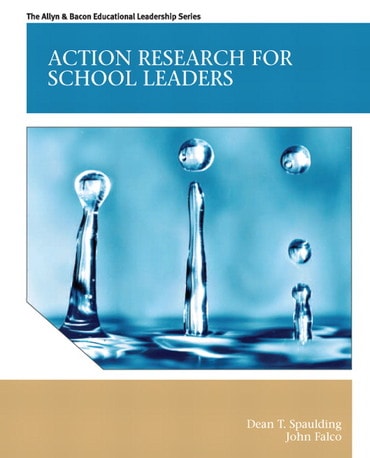
Action Research for School Leaders, 1st edition
Published by Pearson (March 13, 2012) © 2013
- Dean T. Spaulding
- John Falco
Access details
- Instant access once purchased
- Fulfilled by VitalSource
- 180-day rental
Features
- Add notes and highlights
- Search by keyword or page
Access details
- Instant access once purchased
- Fulfilled by VitalSource
- 180-day rental
Features
- Add notes and highlights
- Search by keyword or page
Table of contents
Chapter 1
THE ROLE OF SCHOOL LEADERS IN SCHOOL IMPROVEMENT—PAST,
PRESENT, AND FUTURE
Past to Present
Leadership Matters
Bootstrap Data: Information That Helps
Summary • Key Concepts • Discussion/Reflection
Questions • Activities
Chapter 2
USING RESEARCH TO SOLVE THE PUZZLE OF SCHOOL
IMPROVEMENT
School Administrators’ Use of Research
Types of Research Administrators Encounter
Applied Research Versus Vendor-Based Research
Summary • Key Concepts • Discussion/Reflection
Questions • Activities
Chapter 3
ACTION RESEARCH AND THE INQUIRY PROCESS
What Is Level 1: Classroom-Level Action Research?
Action Research, Naturally
Steps in Level 1: Classroom-Level Action Research
Summary • Key Concepts • Discussion/Reflection
Questions • Activities
Chapter 4
SCHOOL-LEVEL ACTION RESEARCH
Steps in Conducting Level 2 School-Level Action Research
Identifying the School-Level Issue
Developing an Action Research Team
Types of Action Research Teams
Summary • Key Concepts • Discussion/Reflection
Questions • Activities
Chapter 5
ANALYZING DATA AS AN ACTION RESEARCH TEAM
How to Analyze Data as an Action Research Team
Three Main Data Points for Needs Assessment: An Overview
Analysis Techniques
Summary • Key Concepts • Discussion/Reflection
Questions • Activities
Chapter 6
EXAMINING PAST RESEARCH, AND REVIEWING
AND CRITIQUING CAUSE–EFFECT EXPERIMENTAL
RESEARCH
Examining Past Research and Literature
Databases
Selecting from the Review of Literature
Full Text and HTML
The Action Research Team and the Review of Literature
Analyzing the Review of Literature
Creating a Literature Matrix
How to Critique Cause–Effect Research
Experimental Research
How Should Action Research Teams Critique Experimental
Research?
Causal–Comparative Research
Summary • Key Concepts • Discussion/Reflection
Question • Activities
Chapter 7
CRITIQUING AND APPLYING CORRELATIONAL AND
SURVEY RESEARCH
Correlational Research
Caution About Drawing Causality
The Correlational Coefficient
Types of Correlational Research
Statistical Significance
Using Correlational Research
Critiquing Correlational Research
Survey Research
How to Critique Survey Research
Survey Design and Development
Adapting and Adopting Instruments from Survey Studies
Summary • Key Concepts • Discussion/Reflection
Question • Activity
Chapter 8
CRITIQUING AND APPLYING QUALITATIVE
RESEARCH
Qualitative Research
Methods Used for Qualitative Research
Access to Subjects and Settings
Examples of Qualitative Research
Types of Qualitative Research
Using Qualitative Research
Summary • Key Concepts • Discussion/Reflection
Question • Activity
Chapter 9
GATHERING DATA FROM STAFF AND OTHER
STAKEHOLDERS
Gathering Feedback with the Survey
Why Feedback Is Needed
Methods for Gathering Feedback
The Survey and the School Administrator
Effects of a Poorly Constructed Staff Survey
Basic Components of a Survey
Tips for Writing Quality Items
Administering and Collecting the Survey
Methods for Administering Surveys
Summary • Key Concepts • Discussion/Reflection
Questions • Activity
Chapter 10
STEP 2: DEVELOPING A PROGRAM FOR SCHOOL
IMPROVEMENT
Developing Quality Programs and Initiatives
Aligning Need to Program Activities
Introduction of the Logic Models
Why Use a Logic Model?
Logic Model: Basic Building Blocks
Showing Change with a Logic Model
Using Logic Models
Using the Logic Model with Your Action Research Team
Summary • Key Concepts • Discussion/Reflection
Questions • Activity
Chapter 11
STEP 4: IMPLEMENTING THE PROGRAM OR
INTERVENTION WITH FIDELITY
What Is Fidelity in Action Research?
Developing a Fidelity Checklist
and Observational Protocol
Evaluating Professional Development
Evaluating the Fidelity of Professional Development
Summary • Key Concepts • Discussion/Reflection
Questions • Activity
Chapter 12
STEP 5: GATHERING AND ANALYZING DATA
Gathering and Analyzing Standardized Data
Three Levels of Assessment Data
Different Types of Standardized Measures
How to Critique Standardized Measures
Confusing Reliability and Validity
Applying Different Types of Standardized Measures to
Your Logic Model
Summary • Key Concepts • Discussion/Reflection
Question • Activity
Chapter 13
STEP 6: REFLECTING AND MAKING MODIFICATIONS TO
THE PLAN
Reflecting on the Logic Model to Determine Success
Reflecting on Activities
Reflecting on Outputs
Reflecting on Intermediate Outcomes
Reflecting on End Outcomes
The Action Research Team and Making Modifications
Summary • Key Concepts • Discussion/Reflection
Questions • Activities
Chapter 14
CASE STUDY 1: ADDRESSING HIGH TEACHER TURNOVER
AND LOW STUDENT PERFORMANCE
Background and Personal Characteristics of a
School Leader
Step 1: Forming the Action Research Team
Step 2: Conducting the Data Analysis
Step 3: Conduct a Review of the Literature
Your Turn
Step 4: Collection of Additional Data from Stakeholders
Your Turn, Again
Chapter 15
CASE STUDY 2: DECREASING THE PERFORMANCE GAP
BETWEEN GENERAL EDUCATION AND SPECIAL
EDUCATION POPULATIONS
Background and Personal Characteristics of a School Leader
Level of Preparedness
Step 1: Forming the Action Research Team
Step 2: Conducting the Data Analysis
Your Turn
Chapter 16
CASE STUDY 3: ADDRESSING BEHAVIORAL PROBLEMS
AND LOW STUDENT PERFORMANCE
Background and Personal Characteristics of a School Leader
Level of Preparedness
Step 1: Establishing an Action Research Team
Step 2: Analyzing the School
Your Turn . . .
Chapter 17
CASE STUDY 4: IMPROVING LOW ELA SCORES AT THE
ELEMENTARY LEVEL
School Leader
School District
Level of Preparedness
Step 1: Establishing the Action Research Team
Step 2: Analyzing School Data
Your Turn . . .
